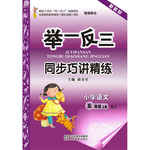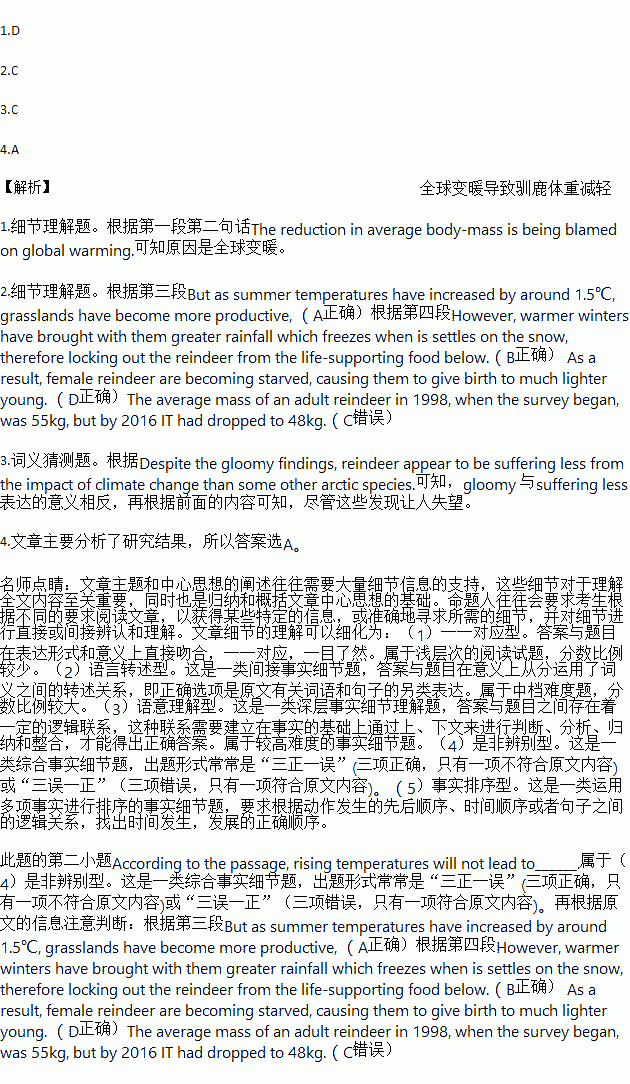题目内容
A 16-year survey on the arctic Norwegian island of Svalbard found the reindeer(驯鹿)there have declined in weight by an alarming 12 percent. The reduction in average body-mass is being blamed on global warming.
In research presented lately at a meeting of the British Ecological Society in Liverpool, scientists will explain how rising temperatures are making female reindeer difficult to obtain nutrients during important periods of being pregnant.
Snow in Svalbard typically covers the ground for eight months of the year, which, combined with low temperatures, limits grass growth to June and July. But as summer temperatures have increased by around 1.5℃, grasslands have become more productive, allowing female reindeer to gain more weight by the autumn and therefore to conceive(孕育)more calves.
However, warmer winters have brought with them greater rainfall which freezes when is settles on the snow, therefore locking out the reindeer from the life-supporting food below. As a result, female reindeer are becoming starved, causing them to give birth to much lighter young. The average mass of an adult reindeer in 1998, when the survey began, was 55kg, but by 2016 IT had dropped to 48kg.
Professor Steve Albon, an ecologist at the James Hatton Institute in Aberdeen , said that, because the mammals have a relatively high surface-area-to-volume ratio(表面积与体积比), they are no particularly energy efficient.
Reindeer can often access the inadequate food sources beneath the snow by clearing IT away with their antlers(鹿角), but they cannot break through the hard ice. Without access to the food in winter, calves are being born far lighter than they should be. Numbers of reindeer have also increased rapidly in the past 20 years, meaning that those which are born are facing greater competition for food. “The implication(含义)are that there may well be more smaller reindeer in the Arctic in the coming decades, but possibly at the risk of catastrophic die-offs because of increased ice on the ground,”said Professor Albon Despite the gloomy findings, reindeer appear to be suffering less from the impact of climate change than some other arctic species.
1.Which of the following may be the most important reason for the smaller reindeer?
A. Heavy snow.
B. Greater rainfall.
C. Hard ice.
D. Global warming.
2.According to the passage, rising temperatures will not lead to_________.
A. grass growing more rapidly in summer
B. more rainfall in the arctic area in winter
C. female reindeer’s gaining more weight in winter
D. female reindeer’s suffering from hunger in winter
3.What does the underlined word“gloomy”in the last paragraph mean?
A. Exciting.
B. Optimistic.
C. Disappointing.
D. Doubtful.
4.How does the writer develop the passage?
A. By analyzing the research.
B. By classification of reindeer.
C. By comparing opinions of experts.
D. By telling stories of different species.
 举一反三同步巧讲精练系列答案
举一反三同步巧讲精练系列答案 口算与应用题卡系列答案
口算与应用题卡系列答案 名师点睛字词句段篇系列答案
名师点睛字词句段篇系列答案我校校报Superview需要一些介绍中国著名省市的稿件。请根据以下提示,用英语写一篇介绍云南省的短文,并投稿。
地名 | 云南省(南部美丽的云彩) |
位置 | 最云南的省份 |
面积 | 393,000平方公里 |
民族 | 拥有25个少数民族 |
地理特征 | 拥有高山,湖泊和热带雨林 |
稀有动物 | 被誉为“动物王国”,有金丝猴,亚洲象等 |
植物 | “世界花园”,拥有世界上一半的植物物种 |
自然奇观 | 石林、虎跳峡等 |
要求:1.可适当填加细节,以使行文连贯;
2.词数100词左右。
参考词汇:石林Stone Forest 虎跳峡Tiger Leaping Gorge 物种species
热带雨林rainforest 少数民族ethnic minority
____________________________________________________________________________________________
____________________________________________________________________________________________
____________________________________________________________________________________________
____________________________________________________________________________________________
____________________________________________________________________________________________
____________________________________________________________________________________________
____________________________________________________________________________________________
__________________________________________________________


 yourself.”
yourself.” ep telling the kids how to behave themselves at dinner.
ep telling the kids how to behave themselves at dinner.